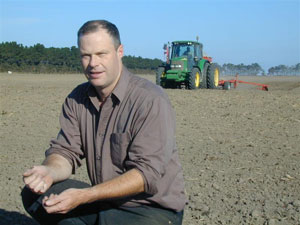Farmer/Farm Manager
Tasks & duties

Farm work varies depending on the time of year and the size and type of farm. Farmers/farm managers may do some or all of the following:
-
manage financial and farming records, including the payment of farm accounts and tax
-
plan how to run the farm
-
manage pasture, stock and stock breeding programmes
-
organise work programmes for staff
-
hire and supervise workers such as shepherds and shearing gangs
-
buy feed, machinery and other farming materials
-
attend stock sales and buy and sell stock
-
allocate sheep and cattle to paddocks to ensure adequate feed is available throughout all seasons
-
muster and shift stock
-
drench, dip (remove parasites), dag and shear sheep
-
wean lambs
-
dock calves and lambs (remove tails)
-
manage and prepare stock for slaughter
-
control pests and weeds, which may include spraying gorse and cutting scrub
-
make winter feed such as hay and silage
-
maintain farm buildings, yards and fences
-
handle and train dogs
Skills & knowledge

Farmers/farm managers need to have:
-
knowledge of farm and business management
-
knowledge of international markets
-
knowledge of animal diseases and animal husbandry
-
animal handling skills
-
knowledge of spraying techniques and other weed and pest control methods
-
knowledge of stock and pasture management (efficient use of paddocks and grasslands)
-
practical skills such as the ability to do fencing, general maintenance and use mechanical tools
-
the ability to use farm machinery and equipment safely
-
driving skills to get around the farm by motorbike, tractor or farm utility vehicle
-
staff-management skills
-
good communication skills
-
organisational skills
Entry requirements
Although there are no specific entry requirements for becoming a farmer/farm manager, a qualification in agriculture is highly recommended.
Secondary education
At least three years of secondary education is recommended to become a farmer/farm manager.
Tertiary education
It is recommended that farmer/farm managers attain at least a national certificate in their chosen field to improve their employment chances. Higher qualifications such as diplomas in agriculture or farm management could be considered and many farmer/farm managers complete degree courses such as a Bachelor of Agricultural Science or Commerce.
Training on the job
Most farming skills, such as fencing and other maintenance work, shearing, drenching, breaking-in and training dogs, and cattle and sheep management, are learned on the job. Farmers/farm managers usually learn about new ideas and farming practices from farm advisers.
Useful experience
Working on a farm as a general farm hand, shearer or shepherd, or attending farming courses or farm cadet training schools may be useful experience for farmers/farm managers. Some experience with computers may also be helpful.
Related courses
Agricultural Science
Animal Husbandry
Business Management
Farm Management and Agribusiness
General Land Skills
Horticulture
Wool and Fibre Harvesting
For more information, please refer to myfuture.
Document Actions
